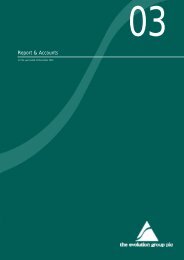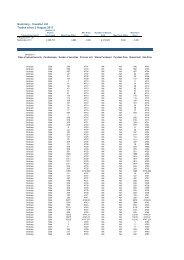Annual Report for the year ended 31 December 2008
Annual Report for the year ended 31 December 2008
Annual Report for the year ended 31 December 2008
Create successful ePaper yourself
Turn your PDF publications into a flip-book with our unique Google optimized e-Paper software.
(b) Share-based plans<br />
The Group’s management awards high-per<strong>for</strong>ming employees bonuses in<br />
<strong>the</strong> <strong>for</strong>m of equity-settled share based payments, from time to time, on a<br />
discretionary basis. in accordance with iFrs 2, ‘share-based payments’,<br />
equity-settled share-based payments are measured at fair value at <strong>the</strong> date<br />
of grant. Fair value is measured by use of <strong>the</strong> Black-scholes pricing model<br />
or, in <strong>the</strong> case of awards of call rights, which have an exercise price of 1p<br />
per ordinary share <strong>the</strong> fair value is based on <strong>the</strong> market value at <strong>the</strong> time of<br />
grant discounted by <strong>the</strong> dividend yield over <strong>the</strong> expected life. The fair value<br />
determined at <strong>the</strong> grant date of <strong>the</strong> equity-settled share-based payments<br />
is expensed on a straight-line basis over <strong>the</strong> vesting period, based on <strong>the</strong><br />
Group’s estimate of <strong>the</strong> number of shares that will eventually vest. The<br />
options are generally subject to three-<strong>year</strong> service vesting condition, and<br />
<strong>the</strong>ir fair value is recognised as an employee benefits expense with a<br />
corresponding increase in o<strong>the</strong>r reserve equity over <strong>the</strong> vesting period.<br />
The proceeds received net of any directly attributable transaction costs<br />
are credited to share capital (nominal value) and share premium when<br />
<strong>the</strong> options are exercised.<br />
(c) Employees’ Share Ownership Plan (“ESOP”)<br />
The esop allows every employee to purchase up to £1,500 worth of <strong>the</strong><br />
Group’s shares per annum on a tax efficient basis. These are purchased on<br />
a monthly basis and held in trust and are matched by shares issued by <strong>the</strong><br />
Group company on a one-<strong>for</strong>-one basis.<br />
Current and deferred income taxes<br />
current income taxes are computed on a basis of <strong>the</strong> tax laws enacted or<br />
substantially enacted at <strong>the</strong> Balance sheet date in <strong>the</strong> countries where <strong>the</strong><br />
Group’s subsidiaries operate and generate income.<br />
Taxes are computed using <strong>the</strong> liability method, deferred income on<br />
temporary differences between <strong>the</strong> bases of assets and liabilities and <strong>the</strong>ir<br />
carrying amounts in Financial statements. The deferred income tax is not<br />
accounted <strong>for</strong> if it arises from initial recognition of an asset or liability in a<br />
transaction, o<strong>the</strong>r than a business combination, that at <strong>the</strong> time of <strong>the</strong><br />
transaction affects nei<strong>the</strong>r accounting nor taxable profit nor loss.<br />
Deferred income tax liabilities are recognised <strong>for</strong> all taxable temporary<br />
differences and deferred tax assets are recognised to <strong>the</strong> extent that it is<br />
probable that taxable profits will be available against which tax losses or<br />
deductible temporary differences can be utilised. such assets and liabilities<br />
are not recognised if <strong>the</strong> temporary difference arises from goodwill, negative<br />
goodwill or from <strong>the</strong> acquisition of an asset, which does not affect ei<strong>the</strong>r<br />
taxable or accounting income.<br />
Deferred income tax liabilities are recognised <strong>for</strong> taxable temporary<br />
differences arising on investments in subsidiaries, except where <strong>the</strong> Group<br />
is able to control <strong>the</strong> reversal of <strong>the</strong> temporary difference and it is probable<br />
that <strong>the</strong> temporary difference will not reverse in <strong>the</strong> <strong>for</strong>eseeable future.<br />
Deferred income tax is charged or credited in <strong>the</strong> income statement, except<br />
when it relates to items charged or credited directly to equity, in which case<br />
<strong>the</strong> deferred tax is also dealt with in equity.<br />
notes to tHe FinanCial statements CONTINuED<br />
FOR THE YEAR ENDED <strong>31</strong> DECEMBER <strong>2008</strong><br />
The Group is entitled to a tax deduction <strong>for</strong> amounts treated as compensation<br />
on exercise of certain employee share options under uK tax rules. As explained<br />
under “share-based plans” above, a compensation expense is recorded in<br />
<strong>the</strong> Group’s income statement over <strong>the</strong> period from <strong>the</strong> grant date to <strong>the</strong><br />
vesting date of <strong>the</strong> relevant options. As <strong>the</strong>re is a temporary difference between<br />
<strong>the</strong> accounting and tax bases, a deferred tax asset is recorded. The deferred<br />
tax asset arising is calculated by comparing <strong>the</strong> estimated amount of tax<br />
deduction to be obtained in <strong>the</strong> future (based on <strong>the</strong> company’s share price<br />
at <strong>the</strong> Balance sheet date) with <strong>the</strong> cumulative amount of <strong>the</strong> compensation<br />
expense recorded in <strong>the</strong> income statement. if <strong>the</strong> amount of estimated<br />
future tax deduction exceeds <strong>the</strong> cumulative amount of <strong>the</strong> remuneration<br />
expense, at <strong>the</strong> statutory tax rate, <strong>the</strong> excess is recorded directly in equity,<br />
against retained earnings.<br />
in accordance with <strong>the</strong> provisions of iFrs 2, no compensation charge is<br />
recorded in respect of options granted be<strong>for</strong>e 7 november 2002 or in<br />
respect of those options which have been exercised or have lapsed be<strong>for</strong>e<br />
1 January 2005. never<strong>the</strong>less, tax deductions have arisen and will continue<br />
to arise on <strong>the</strong>se options. The tax effects arising in relation to <strong>the</strong>se options<br />
are recorded directly in equity, against retained earnings.<br />
Share capital<br />
a) Share issue costs<br />
ordinary shares are classified as equity.<br />
incremental costs directly attributable to <strong>the</strong> issue of new shares or options<br />
are shown in equity as a deduction from <strong>the</strong> proceeds, net of tax.<br />
b) Treasury shares<br />
Where <strong>the</strong> Group purchases its own equity share capital (treasury shares),<br />
<strong>the</strong> consideration paid, including any directly attributable incremental costs<br />
(net of taxes), is deducted from equity attributable to <strong>the</strong> company’s equity<br />
holders until <strong>the</strong> shares are cancelled, reissued or disposed of.<br />
c) Trust shares<br />
The Group’s employee Benefit Trust (“<strong>the</strong> Trust”) uses funds provided by<br />
<strong>the</strong> Group to meet <strong>the</strong> Group’s obligations under <strong>the</strong> employee share option<br />
schemes in place. All shares acquired by <strong>the</strong> Trust are purchased on <strong>the</strong><br />
open market. The consideration paid, including any directly attributable<br />
incremental costs (net of taxes), is deducted from equity attributable to<br />
<strong>the</strong> company’s equity holders.<br />
d) Dividend distribution<br />
Dividend distribution to <strong>the</strong> Group’s shareholders is recognised in equity in<br />
<strong>the</strong> Group’s Financial statements in <strong>the</strong> period in which <strong>the</strong> dividends are<br />
paid. Final dividends are recognised at <strong>the</strong> date <strong>the</strong>y are approved by<br />
shareholders at <strong>the</strong> <strong>Annual</strong> General Meeting.<br />
Earnings per share<br />
Basic earnings per share is calculated by dividing <strong>the</strong> earnings attributable<br />
to ordinary shareholders by <strong>the</strong> weighted average number of ordinary shares<br />
in issue during <strong>the</strong> period, excluding those held in <strong>the</strong> evolution Group plc<br />
employees’ share Trust which are treated as cancelled. For diluted earnings<br />
per share, <strong>the</strong> weighted number of ordinary shares in issue is adjusted to<br />
assume conversion of all dilutive potential ordinary shares and option costs<br />
not yet charged to <strong>the</strong> income statement.<br />
49



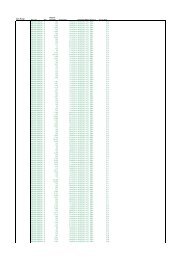
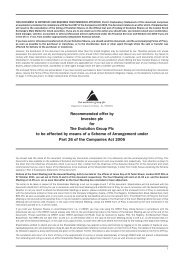
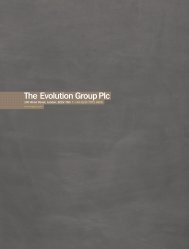

![2. Front continued [c87307] - The Evolution Group PLC](https://img.yumpu.com/19604468/1/184x260/2-front-continued-c87307-the-evolution-group-plc.jpg?quality=85)
